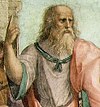Form of the Good
From Wikipedia, the free encyclopedia
Plato describes "The Form of the Good" in his dialogue, the Republic, speaking through the character of Socrates. The Sun is described in a simile as the child or offspring (ekgonos) of the Form of the Good (508c-509a), in that, like the sun which makes physical objects visible and generates life on earth, the Good makes all other universals intelligible, and in some sense provides being to all things in the cosmos, though the Good itself surpasses being.[1] It is the ideal or perfect nature of goodness, and so an absolute measure of justice. Plato also explains his theory of justice in the Republic, in relation to his conception of a city in speech, both of which necessitate rule of the rational mind; in other words, philosopher-kings, who can grasp the Form of the Good.
Plato said that the highest form of knowledge is the Form (or Idea) of the Good, from which things that are just gain their usefulness and value. Humans have a duty to pursue the good, but no one can hope to do this successfully without philosophical reasoning. According to Plato, true science was conversant, not about those material forms and imperfect intelligences which we meet within our daily interactions with all mankind, however it investigated the nature of those purer and more perfect patterns which were the models after which all created beings were formed. Plato supposes these perfect types to have existed from all eternity and calls them the Forms or Ideas. As these Forms can not be perceived by human senses, whatever knowledge we derive from that source is unsatisfactory and uncertain. He maintains that degree of skepticism which denies all permanent authority to the evidence of sense. Having discovered or created the realm of Forms, he surveyed it throughout. Plato defined its most excellent forms from goodness as the "Hierarchy of Forms". This suggests that from goodness comes such things as justice, truth, equality and beauty, among many others. Plato then determines what was the supreme and dominant principle of the whole. It is the Form of the Good.
Aristotle was critical of the Forms of Good, and discussed it several times in both of his major surviving ethical works, the Eudemian and Nichomachean Ethics[2].
'아름다운 삶을 위해 > 宗敎, 經典' 카테고리의 다른 글
| Evil, (0) | 2009.03.28 |
|---|---|
| Good and evil (0) | 2009.03.28 |
| 종교(宗敎)의 정의(定義) 와 그 의의 (0) | 2009.03.22 |
| 儒敎가 종교인가? (0) | 2009.03.22 |
| 종교학 (0) | 2009.03.22 |
